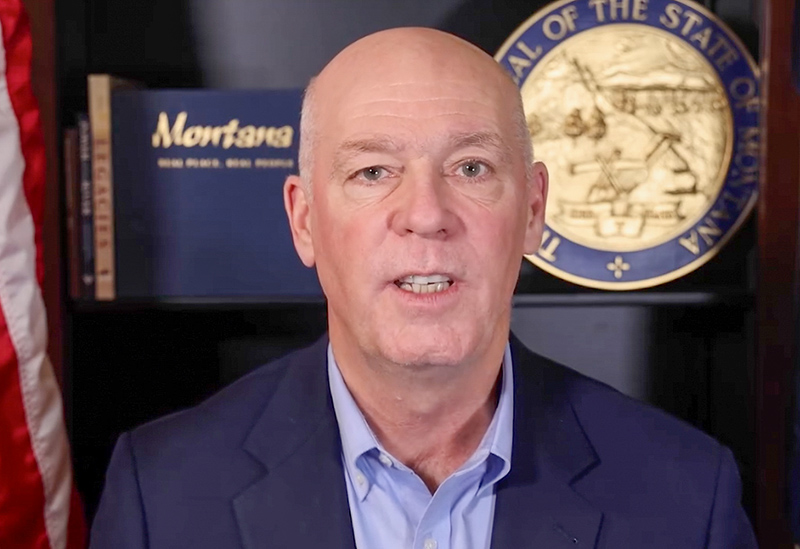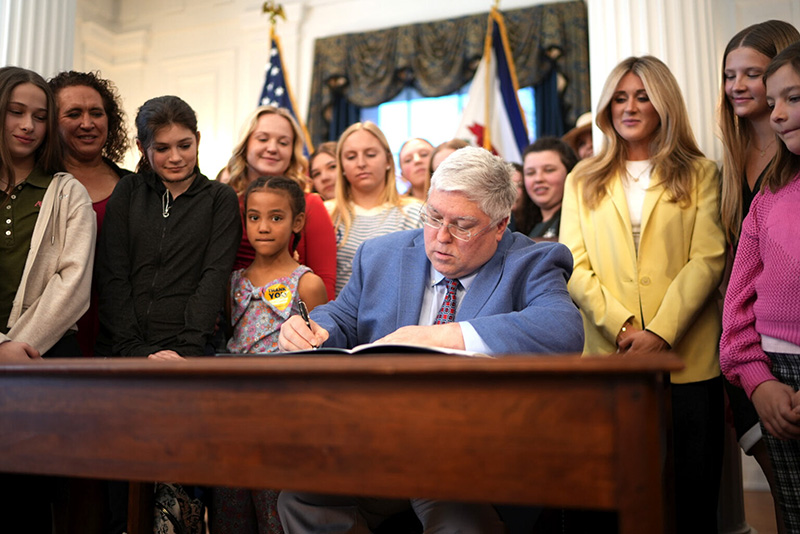Republican Jennifer Williams could become New Jersey’s first openly transgender legislator
Following the example of Virginia's Danica Roem, Williams' campaign is more focused on issues than identity politics

“My biggest enemy is time — and early sunsets,” says Jennifer Williams. “It was a lot easier in the summer time, when I had more time to knock on doors.”
Williams, a Republican who is seeking one of two New Jersey General Assembly seats that represent the 15th Legislative District, is keenly aware that time is a luxury she doesn’t have.
With less than two weeks until the election, Williams — a wife, mother, government contractor, and occasional freelance publicist — is seeking not only to cast herself as a practical, no-nonsense alternative for New Jerseyans, she is also poised to make history: should she succeed on Nov. 5, Williams will become New Jersey’s first openly transgender legislator.
But, rather than spend her time touting her landmark candidacy, Williams has instead taken inspiration from Virginia Del. Danica Roem and is focused on what voters care about most. In New Jersey, that means onerous property taxes and the state’s dire fiscal condition.
“Seeing how our state, financially, is in such a bad way, and having children who are school age myself, we’re reaching the point where a lot of kids in New Jersey can go off to college, the military, or trade school, and never come back,” says Williams.
Specifically, she is focusing on New Jersey Democrats’ veto-proof majority in the General Assembly and why voters should consider electing a Republican to help bring some balance back into the mix.
“It’s a problem because it’s becoming unaffordable to live in New Jersey,” she says, “and having a veto-proof majority just allows one party to do everything by fiat, with no fear of repercussions.”
Williams believes it’s time to bring a different perspective to the halls of Trenton — both politically, as a Republican and a fiscal pragmatist, and socially, as a trans woman and mother of school-age children.
“I felt the time was right for me to step into this race as a candidate, and bring some ideas and solutions that haven’t really been talked about before, particularly as someone who comes from an urban area,” Williams says. “The Republican Party in my state is much more of a party of the suburbs, and I think we need to be part of the conversation in urban areas. And, of course, representation is an important thing. Being in this race as a member of the trans community is an offshoot of all the advocacy work I’ve done over the years.”
As the sole Republican running in what is considered a “safe” Democratic seat, Williams has parlayed her past experience as chair of the Trenton Zoning Board of Adjustment into forming relationships with people in the community and starting discussions around local issues of importance. Because both of the incumbent Democrats representing District 15 were appointed, rather than elected, she’s also uniquely positioned to run an insurgent campaign against figureheads who have not yet proven their ability to win over voters.
That said, she’s fully aware she faces an uphill battle.
“This is known as a very tough race, because it’s a blue district,” she says, while also noting that 40% of the district’s voters are unaffiliated with either the Democratic or Republican parties. “Only 14% of voters are Republicans. So that scares a lot of people away from wanting to run, because it’s not an easy win.
“But for me, I know my district very well. I grew up here. I know from talking to people as an advocate in the local community that there are conversations I can have that other Republicans can not, or that they may not be comfortable having,” Williams adds. “I saw opportunities in this race where others saw problems.”
Already, Williams has seen some success in turning out Republican voters. Even though she was the only Republican on the ballot during the June primary election, the number of Republican voters who cast ballots increased by 92% over the 2015 primary, which may indicate a certain level of enthusiasm for her candidacy.
Williams also notes that the increase in Republican turnout came during a time when local New Jersey media were playing up the historic nature of her candidacy — no openly transgender person has ever sought office to the General Assembly before — and her LGBTQ status, which could have potentially given some more conservative voters pause.
“There was no bad impact, despite a number of stories focusing on my being transgender,” she says. “That means that, at least here in Jersey, there’s fairly good acceptance of LGBTQ people, and that, I think, is a good harbinger for the future.”

Williams says she hasn’t had many overtly negative reactions to her candidacy, save one voter who followed up an in-person stop on the campaign trail by mailing her literature about how she was committing “sin.”
“Certainly, I haven’t had any of the ridiculousness that occurred with Danica Roem when she ran,” she says. “But New Jersey is also much different from Virginia.”
Williams has been attacked for being transgender on some conservative blogs, but her gender identity has largely been an afterthought on the campaign trail. That has been a welcome relief for Williams, who had been concerned that some people might target her family and harass her children if she chose to run for the General Assembly.
Taking a page from Roem’s successful 2017 campaign strategy, Williams, herself an alumnus of the LGBTQ Victory Institute’s candidate training, has been hitting the campaign trail, knocking on doors six days a week, and meeting with voters in order to get her message out to a wider audience.
“I realized that if I was going to do this, I had to meet as many voters as I could, so that if the media started playing up identity issues more than policy, I wanted people to have already met me,” she says. “It’s harder to hate or dislike someone if you already know them.”
Because her party is also President Trump’s, and the president commands so much attention these days, Williams has encountered voters who want to talk about national issues. Instead, she tries to redirect their focus towards local issues, including unemployment, high property taxes, and problems with water quality and the management of Trenton Water Works, which has been forced to issue several “boil water” advisories due to low chlorine levels and outbreaks of Legionnaire’s Disease.
“It’s sort of a litmus test for some people, on both sides, left and right, particularly with the current administration in the White House,” she says. “What I tell people is that this is a local election, a state election. I personally did not vote for President Trump in the last election, I voted for John Kasich. But what I’m focused on is whether you have clean water, whether your property taxes are going to be something you can afford, so you don’t have to have an exit plan to leave New Jersey, and so that you won’t have to leave New Jersey to see your grandkids.”
Williams has also focused part of her campaign on increasing the availability of treatment for those suffering from addiction. She says that if the state is determined to legalize and tax marijuana for recreational use, it is reasonable to mandate that a significant portion be used to help connect those struggling with addiction to treatment services, including those who are incarcerated.
“Unless you can get quality treatment, you can’t rebuild or move on in your life,” Williams says. “I’ve found how similar that can be to a transgender person coming out. You can lose your job, some friendships, some personal relationships. You have to rebuild some aspects of your life.”
Williams recently netted an endorsement from Garden State Equality, the state’s largest LGBTQ organization, ahead of the general election — a significant victory, especially considering that Garden State Equality rarely endorses challengers and typically endorses more Democrats than Republicans.
She also notes that the press coverage of the endorsement can remind Republicans that not every LGBTQ person is necessarily a liberal Democrat. She hopes to use her party affiliation and gender identity to bridge gaps and find common cause between Republicans and members of New Jersey’s LGBTQ community.
“It means a lot to me,” she says. “I’ve done a lot of advocacy work in New Jersey, and the idea of them saying, ‘Hey, she’d be a good leader for our community’ says a lot.”
Read more:
Third Catholic school teacher sues Indianapolis Archdiocese for anti-gay discrimination
GOP activist slams Pete Buttigieg: “We need to make homosexuality unthinkable again”
Virginia Beach human rights commissioner calls homosexuality an “abomination” and a “mental illness”
Support Metro Weekly’s Journalism
These are challenging times for news organizations. And yet it’s crucial we stay active and provide vital resources and information to both our local readers and the world. So won’t you please take a moment and consider supporting Metro Weekly with a membership? For as little as $5 a month, you can help ensure Metro Weekly magazine and MetroWeekly.com remain free, viable resources as we provide the best, most diverse, culturally-resonant LGBTQ coverage in both the D.C. region and around the world. Memberships come with exclusive perks and discounts, your own personal digital delivery of each week’s magazine (and an archive), access to our Member's Lounge when it launches this fall, and exclusive members-only items like Metro Weekly Membership Mugs and Tote Bags! Check out all our membership levels here and please join us today!

























You must be logged in to post a comment.